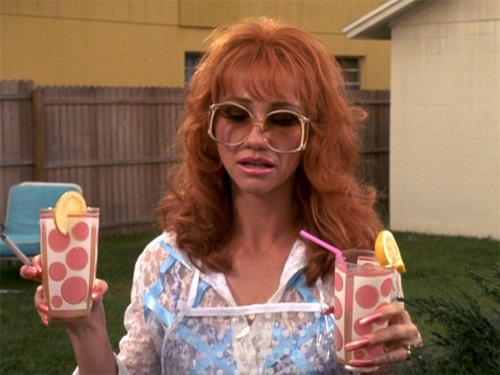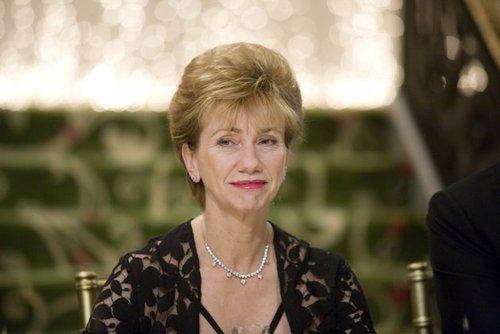
Kathy Baker in Edward Scissorhands
The actress Kathy Baker was born in Midland, Texas, in 1950, and first studied acting at the California Institute of the Arts in the early 1970s. She began working professionally at Magic Theater in San Francisco, appearing in several Sam Shepard plays before her breakthrough role in an off-Broadway production of Fool For Love with Ed Harris. Her Obie-winning performance coincided with a starring role in the film The Right Stuff, which was followed by a supporting role in Street Smart with Morgan Freeman, for which she won both the National Society of Critics and Boston Society of Critics awards.
Subsequent films include Jacknife, Edward Scissorhands, Mad Dog and Glory, Inventing the Abbotts, The Cider House Rules, Cold Mountain, andTake Shelter. In the 1990s, Kathy starred in the CBS series Picket Fences, for which she won three Emmy awards and a Golden Globe. She can currently be seen on stage in Joanna Murray-Smith’s The Gift at Geffen Playhouse in Los Angeles (it runs until March 10th).
I met Kathy Baker in 2007. We were shooting the film Last Chance Harvey with Dustin Hoffman. I was 27 and she was 57, and we clicked. She shines in every role she has ever played, speaks French, loves poetry, and seems to approach life with total openness. For this conversation, we met at the Little Flower Candy Company cafe in Pasadena.
– Liane Balaban
I. WORK
THE BELIEVER: How do you work best with a director?
KATHY BAKER: Well, I work better from encouragement and from being given room. I love a director to tell me to try another way to do it, to suggest another color. I had a director once, Michael Pressman, from Picket Fences. We had a little code where he would say, “I need you to dial up the emotion on this a little bit.” And then I would say, “Ok, I’m dialling it up. You want it up to five or seven?” And he would say, “at least seven.” So then he would come up to me and he would say, “Just one more degree.” And I like that––I like direction, I like parameters, but I do not do well with––uh, I was going to say criticism. There’s a kind of direction that makes you feel like you are all in it together, rather than the director is the king and you are…
BLVR: A puppet?
KB: A puppet. Yeah. It’s much better when we’re both the puppets! [laughs] Or both the kings!
BLVR: Right, because the word director is just a label, the word actor is just a label. We are really all just people coming together to tell a story.
KB: Yeah. The director is guiding. Sam Shepard once said in an interview that the reason he liked our work in Fool for Love was because we would just jump off a cliff for him. With some people, you just jump off a cliff and you just assume there’s going to be a mattress down there. You can just go for it. But with some people, you don’t want to jump off a cliff for them. It doesn’t feel like it would be good. [laughs] Jumping and falling aren’t the same thing. I think you want a director that helps you jump.
BLVR: Can you tell me what Sam was like as a director?
KB: He loves actors. He sits in the back of the theatre and he just howls. He doesn’t direct you by saying, “Why are you doing that? Do this…” or, “Wait a minute, wait a minute, it says this!” He directs by just loving everything that you do. I don’t remember too many directions from him but the main one I remember was, he was sitting in the way back of the theatre and I was about to do this one part, it’s pretty intense––and he suddenly got up, walked all the way down the aisle and he walked up on the stage and he came over to me and he looked at me, and he said, “Kathy, it’s voodoo time.” [laughs] And then he walked away! [laughs] Which to me is just a gift––you can do anything with that! It doesn’t say don’t do something, and it doesn’t say exactly do something… it opens you up for so many possibilities and you get to choose, and that’s what’s so beautiful.
BLVR: What a great acting prompt! Whenever you’re on set or on stage, you can just give yourself… voodoo time.
KB: Exactly, it’s freedom, something wild, something magical, something unexpected.
BLVR: Is it important for you to define the moment a performance begins?
KB: I need that. I need action! I need curtains rising. I need lights––I need a beginning! It’s hard for me to just mush into something. It needs to sort of start. There has to be a definite line between reality and fantasy, or between Kathy and the character––I love that split second between the two.
BLVR: After a take is over, and you hear “cut,” you know it’s the last take and you’re moving on––how do you survive that?
KB: I’m like, oh please move on––let’s move on. I don’t think I can do it any better. That’s it. And it’s funny, because the other day on this movie set there was a long speech I had to give and they shortened it and I was having trouble remembering the lines and the whole thing was kind of a mess and I finally got it and I thought it went well, but every take I was like, Please let that be it, please let that be it. And I wondered at the time, Why are you so anxious to move on? You love being on the set, you love working, why do you want to move on so much? And I wonder if it’s from fear of the more I do it, the more I dry up and it’s gone, so capture it while you can. It’s lightning in a bottle. Get the spontaneity while you can because I’m afraid you won’t be able to repeat it. And yet, in the theatre, you do repeat it, you repeat it the next day and you repeat it in the context of the whole thing. I can be in that world and that light and repeat it when there’s an arc from the beginning of the play ‘til the end, but I worry that I can’t repeat it on camera.
BLVR: [laughs] It’s funny you should say so because I think the opposite is true.
KB: Well… I get a feeling that, Yeah, that was it. That was the one. That felt really good. Now, could it be better? Of course. I’m sure. Better actors than I could make it better but I feel, Oh! That felt good, that was it. It’s amazing when you’re standing there waiting for action… when you’re standing there, my mind always goes blank, and I always go, I have no idea what my line is, and they say action and I absolutely fall like a child, like a baby, like a… like some innocent being, I fall into the scene with complete abandon!
BLVR: My friend Andy Buchan participated in a Q&A at a film festival with an Italian actor and they asked him about process and he said, “Before I go on set, I think, I think, I think I think I think… I think! And then, when I’m on set, when I’m acting, I don’t think.”
KB: And now I’m thinking about Michael Shannon. I was in a Q&A with him for Take Shelter at Sundance and some person asked him about preparation and he said, “Well, uh, first day on the set they gave me a three-ring binder and they said, this is for all your notes and all your preparations…” and he said, “That binder’s still empty.”

Kathy Baker in Last Chance Harvey
II. LIFE
BLVR: If you had become a professional actress at age twenty instead of thirty, what do you think might have happened?
KB: I think I would have ruined it for myself if I’d started in film at twenty. I mean, I did start at age ten in the theatre, but it was all children’s theatre, then high school and college theatre in Albuquerque. I don’t know. I had to grow up. I had to grow up, I had to have life experience, I had to have love affairs, I had to have a broken heart. And if I had all that within the realm of kind of Hollywood movie making, I think I would have ruined myself. I wasn’t ready.
BLVR: We’ve talked about this before – about how challenging it is to be a mother and an actress.
KB: Yeah… I always feel a little bit inadequate talking about this because, I mean, I only have my experience. But it’s incredibly hard to be an actress, a female actor, and have a family… I think that’s incredibly hard. And to keep your intact family – you know, the original husband and father of the family. It’s really really tough. I have no answers, really. I was not successful at that. I’m married to my second husband, and even if I’d been married to Steve [hersecond husband] in the beginning, I’m not sure how well that would have gone. I think two careers… kids… travel… location work… just the nature of our business… it’s really really hard. I think it’s pretty rare to have that intact family and a wonderful career like Meryl Streep.
BLVR: Also, half of marriages don’t work out, regardless of career!
KB: That’s true. Relationships are hard regardless! But I think they feed the artist: relationships, children, life, family – it all feeds the artist. Loss. Joy. Sacrifice.
BLVR: I was looking at this old copy of Architectural Digest that featured homes of starlets from the 1950s, and one actress was reflecting on her life and said, “I always thought I’d have four children and one husband. Turned out that it was the other way around! [laughs]
KB: [laughs] That’s funny! Oh my gosh… that’s a good one, I always thought I’d have five kids, but I didn’t know how I could possibly give everything you need to give to a child and be an actress. I don’t know the answer. Are all artists torn like this? I used to wish I would be a painter or a violinist, where maybe I wouldn’t need to travel as much. Or maybe if I were a writer, I wouldn’t need to travel as much. It’s the travel that kind of killed me. And the hours. I always pictured if I were a painter you could make your own hours maybe… work after the kids were asleep…
BLVR: Maybe if you’re a big movie star and have all of the perks that go along with that, it’s easier… I remember when I worked with Julianne Moore, I was driving in a car with her and her husband, and she was talking to her agent or manager about her next job about how the nanny’s hotel room should be next to her room, and about how her children would be taken care of. It seems if you’re working at that level, it’s much easier to keep your family together.
KB: Oh yeah.
BLVR: Dustin Hoffman, remember his kids? They would come and visit [the set of Last Chance Harvey] in London?
KB: Yes, exactly. Depending on the level, you can demand things. Sometimes I could make a few requests – not demands – depending on the movie. These days they don’t even give you a companion ticket, the way they used to. Our guild has changed so much.




